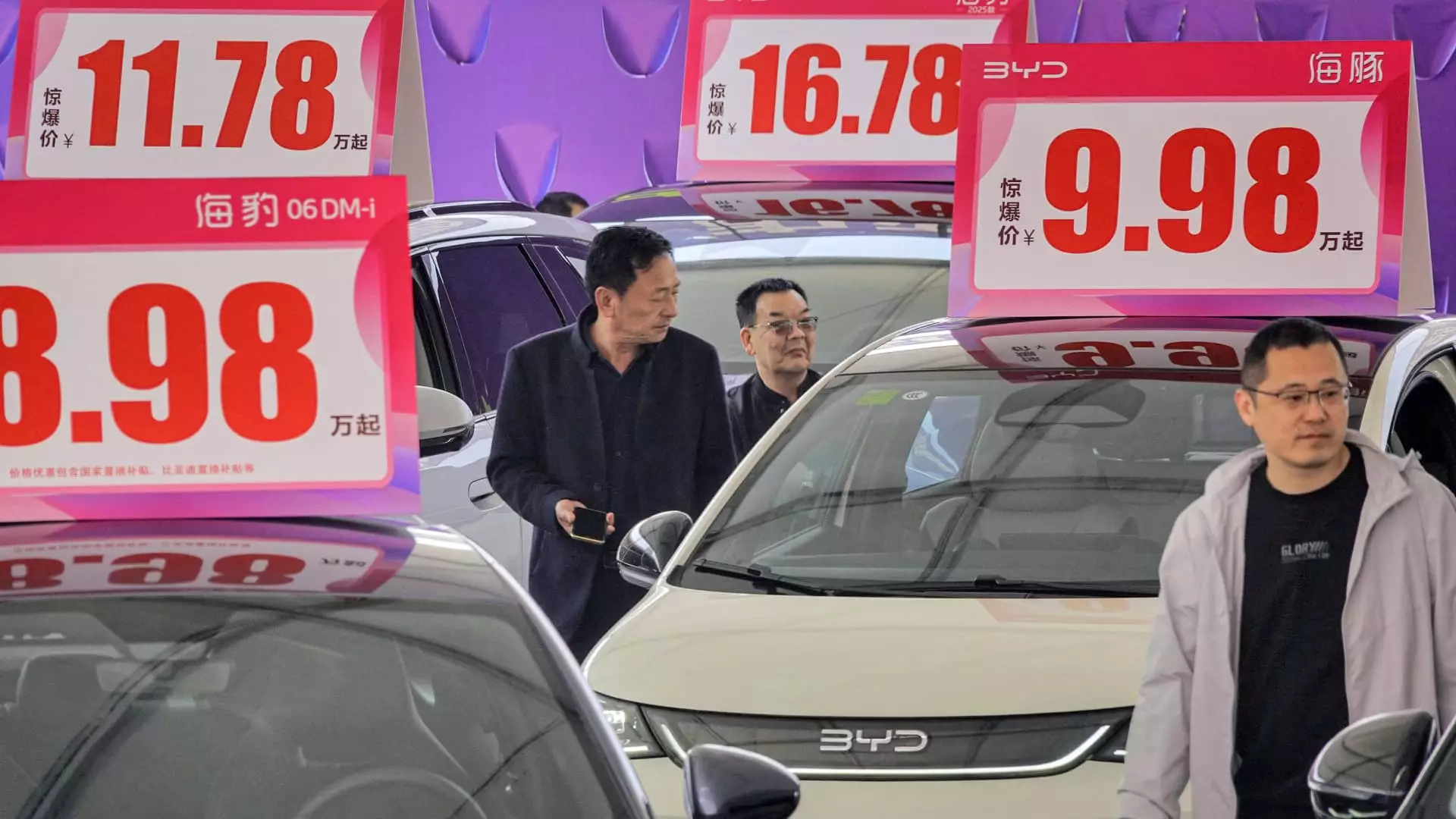In a dramatic turn of events, China’s electric vehicle (EV) market, once heralded as a beacon of innovation, is witnessing an unsettling moment of truth. Industry titan BYD has unleashed aggressive price cuts that could potentially shake the foundations of not only the domestic market but also reverberate throughout the global automotive industry. Seriously steep reductions—some up to 30%—across various battery-only and hybrid models signal an alarming trend, inviting scrutiny over the sustainability of such practices in an already delicate economic environment. The launch of the Seagull compact, now priced at just 55,800 yuan ($7,750), could well be interpreted as a desperate measure rather than a harbinger of consumer choice.
Analysts are worrying that these moves are stoking a “state of nervousness” within the industry, with smaller automakers left to contemplate their survivability in an increasingly hostile landscape. Zhong Shi of the China Automobile Dealers Association characterized the atmosphere as “shock,” highlighting that BYD’s robust position now threatens to overshadow the aspirations of less established competitors and erode profit margins across the board. While consumer-friendly price cuts may seem advantageous, they raise serious questions about the long-term viability of the sector.
A Financial Quagmire: The Echoes of Evergrande
Comparisons have surfaced between the state of the Chinese EV sector and the disastrous outcome of the Evergrande real estate collapse, which plunged the housing market into chaos only a couple of years ago. Great Wall Motors’ chairman Wei Jianjun drew parallels with the EV industry’s rapid ascension reminiscent of the overly inflated real estate bubble that eventually burst. With a wealth of capital backing these companies, it raises the question: are we simply witnessing an over-extension of dreams, or are we flirting dangerously close to a collective financial catastrophe?
The ramifications of a potential collapse would be felt nationwide, just as with Evergrande’s debacle, which saw cascading effects manifesting in loan defaults and plummeting consumer trust. As reported, the financial burden is substantial, with BYD’s current liabilities soaring over 60% to 57.15 billion yuan. The culture of “more for less” may seem prudent in the short term, but does it erode the foundational sustainability of these companies? The disparity in retail prices compared to the U.S., where EV prices are nearly three times higher on average, suggests an unsustainable race to the bottom predicated on subsidies and short-term gains rather than a solid business model.
The Inflationary Loop: A Dangerous Gamble
The ongoing price war is fueled by an imbalance of supply and demand—an outcome that analysts warn could ultimately lead to deflationary pressure. Declarations from notable economists underscore the urgency for rethinking consumption strategies; however, with companies fixated on slashing prices, the old supply-driven model persists stubbornly. If automakers continue along this destructive path in attempts to commandeer market share, will the anticipated consumer demand materialize, or is this merely a short-sighted ploy leading us towards economic stagnation?
Amplifying the existing competition are new entrants vying for dominance, each adopting cost-reduction strategies to stay afloat. The vision of a diversified vehicle offering may fade against the backdrop of unsustainable pricing pressures, and innovations—such as enhanced driver-assist technologies being offered for free—merely add another layer of complexity to this precarious situation.
The International Fallout: Tariffs and Trade Tensions
As China strives to conquer international markets, the socio-economic implications extend beyond borders. The EU has reacted robustly, enforcing tariffs on imports of China-made EVs, citing concerns about unfair trade practices due to governmental subsidies. Likewise, the U.S. imposing punitive duties has put a severe damper on hopes of Chinese automakers making headway into that lucrative market. This paves the way for a potential trade conflict that threatens not only to unravel diplomatic relations but also solidifies the doubts regarding the sustainability of this aggressive automotive paradigm.
In April, an unexpected twist saw BYD outselling Tesla in Europe for the first time, with Tesla’s sales plummeting significantly—a sign that the electric vehicle landscape might be undergoing a seismic shift. Renewal of tensions surrounding imports could further incite retaliatory measures among nations that feel threatened by this rapid expansion of Chinese EVs. The oversized ambitions of manufacturers on an international scale bring into question the ultimate cost of this expansion for the local economy and traditional automotive firms battling to maintain relevance.
The road ahead is set to be a volatile one for China’s electric vehicle market. As price cuts proliferate and competition grows ever fiercer, these practices may be driven by a sense of urgency, but they could also herald the impending risks of economic destabilization. The dream of a clean and sustainable automotive future sits perilously on the edge of a blade—one that might not be quite as welcoming as it seems.

